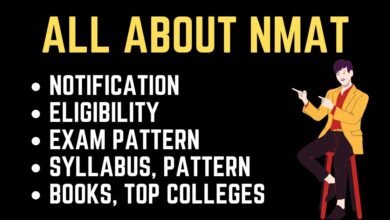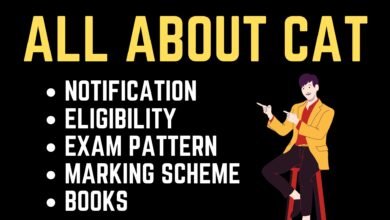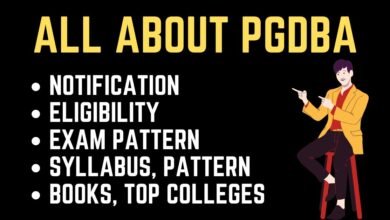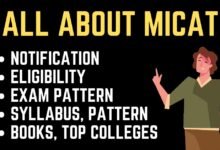All about CMAT Exam 2026
CMAT 2024: Exam date, Registration, Exam Pattern
CMAT Exam 2026: The Complete MBA Guide
- About CMAT
- Why Take CMAT?
- Eligibility Criteria
- CMAT 2026 Dates & Important Deadlines
- Registration & Application Process
- Exam Pattern and Marking Scheme
- Syllabus (Section-wise/Topic-wise)
- Top Colleges Accepting CMAT & Their Cut-offs
- Previous Year Exam Analysis
- Result, Score, Rank, and Percentile
- Admission/Selection Process After Exam
- Preparation Tips & Study Plan
- FAQs
- Useful Resources & Download Links
1. About CMAT
The Common Management Admission Test (CMAT), conducted annually by the National Testing Agency (NTA), is one of India’s biggest MBA entrance exams for entry into 1,300+ AICTE-approved management institutes—including JBIMS, K J Somaiya, Great Lakes, Welingkar, IFMR, BIMTECH, and many top state universities. Recognized nationwide, CMAT scores are used for MBA, PGDM, and other management admissions for the 2026–2028 cycle.
2. Why Take CMAT?
- Accepted by 1,300+ MBA/PGDM colleges across India—a wide range of options.
- Relatively moderate difficulty—ideal as backup or primary exam if you’re targeting ROI or emerging B-schools.
- Important for Maharashtra (JBIMS, SIMSREE, PUMBA), Delhi, Gujarat, UP, MP, Rajasthan, and other state admissions.
- Recognized for key specializations—Marketing, Finance, Operations, Rural, Retail, Innovation, Analytics and more.
- Government conducted, transparent, and accepted even by public/Govt. universities.
3. Eligibility Criteria
- Education: Bachelor’s degree in any discipline (final year students can apply).
- Age limit: None.
- Nationality: Indian citizens only.
- Attempts: No limit—appear every year!
Special note: Some colleges may have higher eligibility or graduation % or additional state domicile criteria for specific quota admissions. Always check institute requirements.
4. CMAT 2026 Dates & Important Deadlines
| Event | CMAT 2026 Date (Tentative) |
|---|---|
| Registration Starts | First week of February 2026 |
| Last Date to Apply | First week of March 2026 |
| Admit Card Download | Last week of March 2026 |
| Exam Date | Early April 2026 (single day, multiple shifts) |
| Result Declaration | Second week of April 2026 |
5. Registration & Application Process
- Apply at cmat.nta.nic.in (official NTA site)
- Register with mobile/email, create password/username
- Fill online application: personal, academic, and test city preference (select 4 preferred cities)
- Upload photo & signature as per specification
- Pay exam fee (INR 2,000 for General; INR 1,000 for SC/ST/PwD/OBC/Women)
- Submit and save your confirmation page/PDF for future reference
Please remember: Each B-school needs a separate application post-CMAT result. CMAT application is only for the exam slot.
6. Exam Pattern and Marking Scheme
CMAT is a computer-based test (CBT) with 100 questions in 180 minutes—covering Quant, Reasoning, Language, General Awareness, and Innovation-Entrepreneurship.
| Section | No. of Questions | Marks | Type | Marking |
|---|---|---|---|---|
| Quantitative Techniques & Data Interpretation | 20 | 80 | MCQ | +4/-1 |
| Logical Reasoning | 20 | 80 | MCQ | +4/-1 |
| Language Comprehension | 20 | 80 | MCQ | +4/-1 |
| General Awareness | 20 | 80 | MCQ | +4/-1 |
| Innovation & Entrepreneurship | 20 | 80 | MCQ | +4/-1 |
| Total | 100 | 400 |
- No sectional time limit; any order of attempting sections
- All questions are MCQs (no subjective/TITA); one mark deducted for wrong answer
7. Syllabus (Section-wise/Topic-wise)
Quantitative Techniques & Data Interpretation (QT & DI)
- Arithmetic: Percentages, Averages, Profit & Loss, SI/CI, Ratio–Proportion, Mixtures
- Algebra: Equations, Progressions, Log/Functions
- Geometry: Lines, Angles, Triangles, Circles, Mensuration
- Modern Math: Permutation–Combination, Probability, Sets
- Data Interpretation: Bar/Line/Pie/Table, Caselets
- Numbers, Series, Statistics
Logical Reasoning (LR)
- Series, Coding–Decoding, Blood Relations
- Arrangements (linear/circular/matrix)
- Direction Sense, Ranking
- Input–Output, Syllogisms, Venn Diagrams
- Critical reasoning, Assumption–Conclusion, Assertion–Reasoning
Language Comprehension (English)
- Reading Comprehension (short passages, fact/inference/grammar/vocab Qs)
- Para-jumbles, Sentence Correction
- Synonyms/Antonyms, Idioms/Phrases
- Fill in the blanks, Cloze test, Analogy, One-word substitution
General Awareness (GK/Current Affairs)
- Current events: Economy, Banking, Business, National-International news
- India & World, Sports, Geography, Science, Awards, Books, Politics, Policy
- Static GK: History, Literature, Organizations, Personalities, Dates
Innovation & Entrepreneurship
- Entrepreneurship and startups in India
- Government schemes and business policy
- Types of entrepreneurs, Famous entrepreneurs, Business models
- Innovation concepts: Design Thinking, MVP, Funding, Incubators
- Recent trends in business/innovation nationally and globally
Download full syllabus PDF from Resources below.
8. Top Colleges Accepting CMAT & Their Cut-offs
| Institute | Intake | Avg. Salary (LPA) | Fees (INR Lakh) | Expected Cut-off (Score/%ile) |
|---|---|---|---|---|
| JBIMS Mumbai | 120 | 28.0 | 6.0 | 99.99%ile (340+) |
| K J Somaiya, Mumbai | 600 | 13.1 | 18.8 | 92-95%ile (275+) |
| Goa Institute of Management (GIM) | 360 | 14.5 | 18.0 | 95%ile (300+) |
| Welingkar Mumbai (MMS) | 180 | 12.2 | 13.0 | 90-95%ile (275+) |
| Great Lakes Chennai (PGDM) | 240 | 14.5 | 12.0 | 90%ile (260+) |
| BIMTECH Noida | 420 | 11.0 | 12.0 | 85%ile (230+) |
| IFMR GSB (Krea University) | 180 | 13.5 | 14.6 | 85%ile (220+) |
| PUMBA Pune | 180 | 10.0 | 4.0 | 97-98%ile (310+) |
| SIMSREE Mumbai | 120 | 14.5 | 3.0 | 99%ile (325+) |
| Department of Management Studies, NITIE Pune/Delhi/Bangalore (various) | 140 | 14.0 | 8.0 | 90%ile (250+) |
Intake/salary values as per 2025 placements; cutoffs may vary yearly and by category; check institute website for exact 2026 data post result.
9. Previous Year Exam Analysis
- 2024 Registrations: 76,745 (steady YOY growth)
- Pattern unchanged in recent years: 100 MCQs, 5 sections
- Toughness: Moderate overall. Quant moderately tough; Reasoning and English moderate; GK and Innovation section unpredictable.
- Good Attempts: 75–85 with 80%+ accuracy for 99+ percentile
- Innovation section: Case-based, real-world startup/business scenario, many practical Qs rather than theory
| Section | No. of Qs | Good Attempts | Difficulty |
|---|---|---|---|
| Quant & DI | 20 | 15+ | Moderate–Tough |
| LR | 20 | 16+ | Moderate |
| Language | 20 | 15+ | Easy–Moderate |
| GK | 20 | 7–9 | Moderate–Tough |
| Innovation & Entrepreneurship | 20 | 13–15 | Easy–Moderate |
10. Result, Score, Rank, and Percentile
- Results announced online at cmat.nta.nic.in; scorecards downloadable
- Select colleges publish their own cut-offs post result (Raw Score & Percentile)
- All India ranking and percentile available in your CMAT scorecard (based on best attempt if multiple sessions)
- Marking: +4 per correct, -1 per wrong, 0 for unattempted
| Raw Score | Percentile (approx.) |
|---|---|
| 340–360 | 99.9+ |
| 290–330 | 99–99.8 |
| 230–280 | 90–98 |
| 180–220 | 75–89 |
11. Admission/Selection Process After Exam
- Apply separately to each CMAT-college you’re interested in after result
- Shortlisting usually based on CMAT score/rank, profile, category
- Further steps: Group Discussion (GD), Written Ability Test (WAT), Personal Interview (PI) vary by college
- Composite merit: CMAT score, academic record, work ex, diversity, performance in GD-PI rounds
- Final offers & waitlists usually in May/June (cycle varies across B-schools/state CAPs)
12. Preparation Tips & Study Plan
- Target 2–4 months focused prep—most concepts overlap with CAT, XAT, SNAP, CET
- Practice with full-length mocks—simulate actual test environment
- Strengthen Quant basics: arithmetic, DI sets, short calculation tricks; revise geometry & numbers
- Read editorials/daily news digests for English & GK; revise weekly highlights for GA/IE
- Reasoning: Practice puzzles, arrangements, series, critical reasoning daily; most scoring section
- For Innovation: Prepare key business/startup concepts, recent government schemes, caselets on entrepreneurship
- Review past year papers—pattern and concept repetition is common
- Apply/plan for preference order of colleges in advance (especially for DTE-CAP/Centralized processes)
13. FAQs (Trending in Google, 2025–26)
- What is CMAT exam? – A national MBA entrance test conducted by NTA for 1,300+ AICTE-approved institutions.
- Is CMAT compulsory for MBA? – Needed for admission to many public/private B-schools not covered by CAT/XAT.
- Who conducts CMAT? – National Testing Agency (NTA).
- When is CMAT conducted? – Usually in April each year.
- Who is eligible for CMAT? – Any graduate or final year undergraduate.
- Is there any age limit? – No.
- How is CMAT tougher than CAT? – CMAT is generally easier, but covers wider syllabus (5 sections); less competitive than CAT.
- Do I need to apply separately to colleges after CMAT? – Yes, for nearly all—check each institute’s process/deadlines.
- Does CMAT have negative marking? – Yes, -1 for each incorrect answer.
- How many attempts for CMAT? – No limit; you can appear every year.
- What is a good CMAT score? – 300+ for top-10, 250+ for good ROI/second-rung B-schools.
- Which are top MBA colleges under CMAT? – JBIMS, K J Somaiya, GIM, Welingkar, PUMBA, Great Lakes, more (see table above).
- What is the application fee for CMAT? – INR 2,000 (General); INR 1,000 (reserved/female).
- Is General Awareness compulsory in CMAT? – Yes; 20 marks, can decide percentile at higher cut-offs.
- When are results declared? – Usually 10–15 days after the exam.
- Are CMAT scores valid for more than one year? – No, only for the current cycle.
- How can I download CMAT admit card? – From cmat.nta.nic.in using your registration/login details.
- Does CMAT have sectional cut-off? – Most institutes consider overall score; few may consider sectionals; check college policy.
- Can final year students apply? – Yes, provisionally; must graduate by admission year.
- Which is the best book for CMAT? – Arun Sharma’s Quant & LR, TMH for English, Disha/Manorama for GK, official NTA sample papers.
14. Useful Resources & Download Links
- CMAT Official Website
- CMAT Study Material
- CMAT Previous Year Papers / Mock Tests
- Top Colleges Accepting CMAT – Full List
Final Words
CMAT offers the widest MBA admit opportunities after CAT—and is your ticket to many of India’s best ROI, public, and private B-schools. With smart preparation, clear college shortlisting, and strong application planning, you can crack CMAT and get your desired MBA seat in 2026. Want more? Leave questions in comments or see our resources and college guides. Best of luck!
Read More: MBA Entrance Exams








